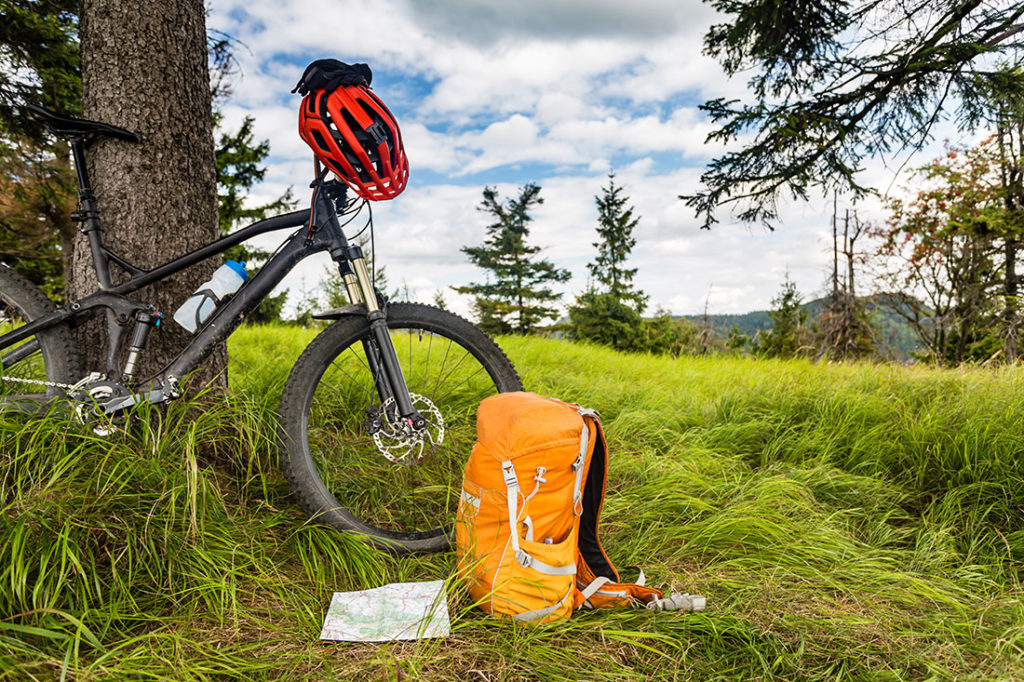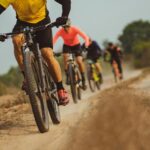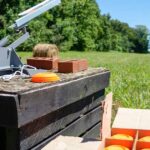I should have walked my bike across the busy highway. But the closest car was far away, so I climbed into my seat, clipped my feet into the pedals and cranked, albeit slowly.
I rode across the first of two lanes at walking speed with eight other friends, some of them riding, some pushing their bikes. As we got halfway across the second lane, a rider in front of me and to my right suddenly cut me off. I grabbed my brakes, too hard, as it turns out. I came to a complete stop, never a good idea when your feet are clipped to the pedals. As I felt myself falling over to the left, I knew I didn’t have time to unclip. I said “oh, s***” and BAM! hit the ground, landing on my left shoulder, arm and hip.
I picked my bruised pride off the pavement, pushed my bike into the median and noticed when I got there that the chain had fallen off. As I put the chain back on and turned the pedal to make sure it stuck, I thought of how the freelance life is one of endless pivots after being cut off. Sometimes we make them well and speed along, sometimes we crash and have to put the chain back on in the median.
As solopreneurs, we are constantly adding to or enhancing our skill set. I have tweaked mine over and over, sometimes intentionally, sometimes out of necessity, and sometimes I only realize I have done so afterward.
Ten years ago, if you had told me I would be riding a bike 250 miles across Missouri on assignment, I would have thought you had the wrong Matt Crossman. Five years ago I would have thought, maybe I can do that. A year ago I would have said, I’m doing that again? This was the third time in two years I landed such a gig and only in retrospect can I see the small pivots that collectively made those stories possible.
As solopreneurs, we are in a never-ending hunt to make ourselves more marketable and more valuable without diluting the talents and abilities that make us unique. By becoming more of us, we must not become less.
In addition to pivoting to long-distance bike riding, I’m also pivoting into a new content field: In February, I started co-hosting a podcast. Here’s what I’ve learned about learning new things.
You can’t expect to be as good at the new thing right away as you are at your core work.
As obvious as this sounds, I have to remind myself of it constantly. Whatever you’re pivoting toward, you can’t measure it the same way as you do with your solidified skills. You can’t judge yourself the same way, and you can’t forecast the future the same way. If you’re a solopreneur, you’re all but certainly an overachiever, and you all but certainly can’t stand to struggle at something. When you’re pivoting, give yourself a break.
The route I crashed on is called the Way of the American Genius because it goes by the boyhood homes of JCPenney, Walt Disney, General Jack Pershing and Mark Twain. For me, the Way of the American Genius often felt more like the Way of the American Slowpoke.
For three days, I labored far behind most of my friends. When we restarted after stopping for lunch or a drink, they soon disappeared into the distance. That frustrated me. I wanted to be as fast as they were. I don’t bring up the rear in my profession, and I don’t want to do so on a bike ride (or anything else, for that matter). Then I remembered most of those guys were either 15 years younger than me or more experienced riders or both. It’s not so much that I was slow but that they were fast.
In the same way, I can’t compare my performance on podcasts to veterans of that genre. Nor can I look at our download numbers and draw relevant conclusions. I’m not saying don’t analyze how you’re doing. I’m not saying don’t measure yourself. I’m saying instead of asking rigidly data-based questions like how fast did I go or how many people listened to that podcast, I prefer more open-ended queries when I’m pivoting. Better questions to ask are, am I enjoying myself? Am I learning? Am I getting better? Do I see a clear path to excellence?
You already know more than you think
I have now taken three bike rides of 250 miles or more, twice in three days, once in four. Frayed nerves from fear of failure meant I slept poorly before and during each of them. I had to remind myself, constantly, that I knew how to ride a bike. I had to remind myself, constantly, that I am in good enough shape to finish such rides.
It’s similar with the podcast. Before the first one, I wondered what I had gotten myself into. If I look at it too broadly—I’m co-hosting a podcast, which I’ve never done before—it can feel daunting. But if I break it down into pieces, it feels much more manageable.
I had to remind myself, constantly, that it’s an existing podcast, not a new one, and that the topic—male community leadership—is one I was immersed in for years. I had to remind myself, constantly, that the main skills required for my role—identifying good stories, booking guests and interviewing them—are all exactly what I have done as a writer for decades. I am using the same muscles, just in a different way.
The best way to learn is to fail.
Just as being able to ride a bike doesn’t make me a good long-distance rider, knowing which guests to book, how to book them and how to interview them does not make me a good podcaster. I will get better at both only by failing and learning from it.
During the most recent long ride, my hands, arms and shoulders ached more than my legs. That’s because the 10 fastest speeds I’ve ever reached on a bike were all in those three days; on every big hill, I death-gripped the handlebars and brakes to manage that speed.
I was physically capable of going faster. My brain would not let me. Inexperience held me back. I’ll get faster as I get more comfortable. The irony is all of my crashes so far have been because I was going too slow, not too fast.
When I watch and listen to my podcasts, I see similar failures of inexperience. The first couple, I recorded from my desk, which is poorly lit. I moved closer to a window, which helped immensely. More than once words have come out of my mouth that I wanted to put right back in. Most jarring (to me, at least), is my listening face looks like a frown. Frankly I look miserable. I had no idea that’s what I looked like. I’m trying to fix that… without using a fake smile that makes it worse.
Lean on your experience, even if it seems unrelated.
One reason we’re reluctant to make pivots, even small ones, is because we grow complacent. We like being good at what we’re good at. We don’t realize how elastic we are or how transferrable skills are.
When I’m anxious before or during a pivot, I have found it helpful to look back at other changes I have made in my career. I’ve switched from newspapers to magazines, writing to editing, editing back to writing, news to sports, hard news to features, sports to travel and adventure, staff to freelance, and a thousand other small changes. I’ve done side hustles in radio, TV and consulting.
When I look at it that way, it’s much easier to round up the confidence to try something new. I sometimes tell college students or young journalists that the way to write a great story is to first write 1,000 bad ones. Because I’ve already learned how to learn, it won’t take me 1,000 bad podcasts to make one great one. I won’t have to crash my bike 1,000 times to become a great long-distance rider.
My left shoulder, arm and hip sure hope not.
Photo by Blazej Lyjak/Shutterstock










